Arctic Exploration
Humans have been exploring the North American Arctic for centuries, beginning about 5,000 years ago when Palaeoeskimos were looking for a homeland, followed by the Thule — ancestors of the Inuit. Europeans began exploring the Arctic in the Elizabethan era when English seamen sought a shortcut to Asia by the seas north of America — the so-called Northwest Passage.
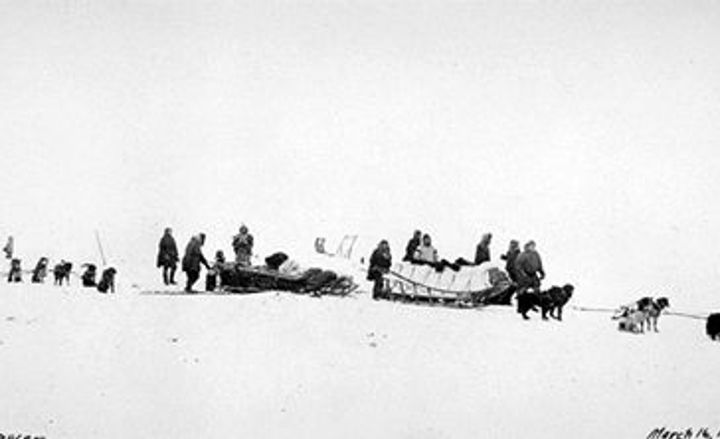
-
January 01, 1576

Events
Frobisher launches first expedition
Martin Frobisher's first expedition left England in June 1576 and probably sighted what is now called Resolution Island (near Labrador) by the end of July. Factors including poor weather would eventually force Frobisher west, but not before he entered the bay that now carries his name (Frobisher Bay) — though he believed it was a strait — on present-day Baffin Island. There, he and his crew met the resident Inuit.
-
August 11, 1576
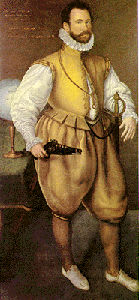
Events
Frobisher Sights Baffin Island
Martin Frobisher sighted the bay in Baffin Island that now bears his name.
-
January 01, 1577

Events
Frobisher launches second expedition
Martin Frobisher was appointed high admiral of his fleet and departed with his crew in the late spring of 1577, reaching Baffin Island in mid-July. He had direct orders from his sponsors to temporarily place his search for the Northwest Passage on hold in favour of gathering gold ore.
-
January 01, 1578
Events
Frobisher launches third expedition
Martin Frobisher was chosen to lead 15 vessels and establish a colony on Baffin Island. The expedition left England in May 1578, arriving at Frobisher's “strait” in July. Attempts to start a settlement were eventually given up, and Frobisher and his men returned to England at the end of August.
-
August 31, 1578
Events
Frobisher’s “Fool’s Gold”
Explorer Martin Frobisher set out from Frobisher Bay to return to England, his ships loaded with what he thought was gold ore. He and his men had mined over a thousand tonnes of ore in the previous month, which turned out to be worthless iron pyrite, or “fool’s gold.”
-
June 11, 1603
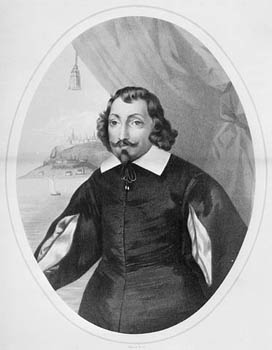
Events
Champlain Learns of Hudson Bay
Samuel de Champlain travelled nearly 60 km up the Saguenay River, and learned from the Montagnais tribe that a large saltwater body existed to the north (the Hudson Bay).
-
August 03, 1610

Events
Hudson Enters Hudson Bay
Henry Hudson entered Hudson Bay. He wintered on the coast of James Bay.
-
June 23, 1611

Events
Hudson's Crew Mutinies
Henry Hudson's crew mutinied and set Hudson, his son John and 7 others adrift in a small boat. They were never heard from again.
-
September 07, 1619
Events
Munk at the Churchill River
Explorer Jens Eriksen Munk, searching for the Northwest Passage to Asia, crossed Hudson Bay and discovered the Churchill River instead. He claimed the area for Denmark, calling it “Nova Dania.”
-
July 17, 1771

Events
Hearne Reaches the Arctic
Samuel Hearne, exploring inland from Churchill with his Native guide Montonabbe, reached the Arctic Ocean via the Coppermine River; he returned via Great Slave Lake.
-
July 12, 1776
Events
Cook Sails from Plymouth
In search of a Pacific-coast exit from the Northwest Passage, Captain James Cook set sail on his third and final voyage. Though he would discover the Sandwich Islands (now the Hawaiian Islands) on this voyage, Cook's expedition was blocked entry to the Northwest Passage by a frozen Bering Strait.
-
April 16, 1786

Explorers
Birth of Sir John Franklin
Sir John Franklin, arctic explorer whose loss triggered the greatest search in the history of exploration, was born at Spilsby, Eng.
-
July 10, 1789

Events
Mackenzie Reaches Arctic
Alexander Mackenzie travelled down the Mackenzie River and reached the Arctic Delta.
-
December 19, 1790

Explorers
Birth of William Parry
Arctic explorer Sir William Parry, who ranks among the great navigators for penetrating the Arctic Archipelago, was born at Bath, Eng.
-
June 01, 1831

Events
North Magnetic Pole Found
Sir James Clark Ross located the North Magnetic Pole. He set up the British flag, took possession of the North Magnetic Pole and adjoining territory in the name of King William IV, and erected a cairn.
-
November 13, 1849
Explorers
Birth of Charles Constantine
Mounted policeman Charles Constantine, who led the first police expedition to the western Arctic, was born at Bradford, Yorkshire.
-
January 10, 1850

Events
Search for Franklin Begins
Robert McClure and Richard Collinson began the extensive search for Franklin, likely the greatest search mission in the history of exploration. In the process, more was revealed of the geography of the North than at any other time.
-
April 15, 1853

Events
Rae Searches for Franklin
John Rae set out from Fort Confidence on a search for Sir John Franklin. He covered 1126 km of previously unknown coastline.
-
October 22, 1854

Events
Rae Learns Fate of Franklin
John Rae learned of the fate of Franklin and his crew from Inuit around Pelly Bay. Franklin's ship had become frozen into the northern ice in 1846, setting off one of the most extensive rescue operations in the history of exploration. Based on Inuit reports and evidence of personal effects, John Rae claimed the £10,000 reward for settling Franklin's fate.
-
May 24, 1861
Explorers
Birth of Albert Peter Low
Geologist and explorer Albert Peter Low was born in Montréal, QC. He led an Arctic expedition in 1903. Aboard the Neptune, Low and his team mapped the waters of Hudson Bay and lands further north. He collected information and photos of Inuit peoples who inhabited the area.
-
July 16, 1872
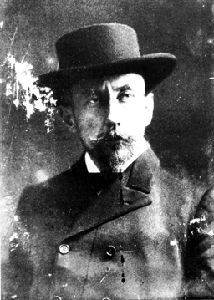
Explorers
Birth of Roald Amundsen
Arctic explorer Roald Amundsen, who sailed the Gjoa, the first ship to cross the top of North America, was born at Sarpsborg, Norway.
-
August 15, 1875
Explorers
Birth of Robert A. Bartlett
Renowned Arctic explorer Robert A. Bartlett was born in Brigus, Newfoundland. Bartlett accompanied explorer Robert Peary on three journeys to find the North Pole. In 1913 he captained the doomed Karluk for the Canadian Arctic Expedition. Bartlett’s quick thinking during the Karluk’s sinking saved his crew and the ship’s supplies.
-
December 31, 1876
Explorers
Death of Tookoolito
Inuit Arctic guide Tookoolito, also known as Hannah, died. Born on Cape Searle (in present-day Nunavut), Tookoolito joined exploration expeditions with her husband, Ipiirvik. They accompanied American explorer Charles Hall on his Arctic journeys, including the ill-fated Polaris expedition, during which the couple saved many of the crew from icy deaths.
-
November 03, 1879

Explorers
Birth of Vilhjalmur Stefansson
Arctic explorer Vilhjalmur Stefansson, who was one of Canada's most renowned arctic explorers, was born at Arnes, Man.
-
September 01, 1880

Events
Arctic Sovereignty
British sovereignty over the Arctic Islands passed to Canada.
-
April 21, 1902
Events
Peary Turns Back
Robert Peary turned back at 84°17' north latitude, in his attempt to reach the North Pole.
-
August 26, 1905

Events
Amundsen Completes Passage
Roald Amundsen, travelling west of King William Island, sighted an American whaling ship that had come from San Francisco. At this point, he knew that he had achieved the Northwest Passage, a quest that had obsessed explorers for nearly 400 years.
-
November 05, 1905

Events
Amundsen Tells World of Achievement of Passage
Roald Amundsen and an American companion reached Eagle City, Alaska, after a voyage by dog sled over 800 km of ice from his ice-bound ship. There he was able to use the telegraph to announce to the world that he had completed the Northwest Passage.
-
April 06, 1909
Events
Peary Reaches North Pole
American explorer Robert Peary claimed to be the first person to reach the North Pole.
-
July 01, 1909

Events
Bernier Proclaims Sovereignty
Captain J.-E. Bernier unveiled a tablet at Winter Harbour, Melville Island, proclaiming Canadian sovereignty over the entire Arctic Archipelago for Canada, from the mainland to the North Pole.
-
January 01, 1913

Events
Canadian Arctic Expedition
In June 1913, the Canadian Arctic Expedition departed Victoria, BC. The Canadian Arctic Expedition (1913–18) was Canada’s largest, most expensive and scientifically sophisticated Arctic venture to that date. The venture — which included many Iñupiat (Alaskan Inuit), Inuvialuit (Western Arctic Inuit) and Inuinnait (Copper Inuit) — asserted Canada’s sovereignty in the Arctic Archipelago, discovered new islands, remade the map of the Far North, and collected a vast amount of scientific data.
-
January 11, 1914
Events
Sinking of the Karluk
The Karluk, flagship of the Canadian Arctic Expedition, sank into the icy waters off the coast of Siberia. Captain Robert A. Bartlett had been concerned earlier that the ship would not survive its treacherous, ice-packed journey to Herschel Island, north of Yukon.
-
May 07, 1928
Events
St. Roch Launched
The RCMP schooner St. Roch was launched at the Burrard Shipbuilding & Drydock Company, North Vancouver, BC. It would become the first ship to sail the Northwest Passage from west to east and to circumnavigate North America.
-
June 18, 1928

Events
Amundsen Lost
Roald Amundsen, Norwegian polar explorer, was lost on a rescue mission in the Arctic.
-
November 12, 1930
Events
Norway Recognizes Sovereignty
Norway formally recognized the sovereignty of Canada over the Sverdrup Islands in the Arctic.
-
June 23, 1940

Events
West to East Northwest Passage
An RCMP patrol commanded by Henry Asbjorn Larsen sailed from Vancouver in the St. Roch. They reached Halifax via the Arctic, in the first successful west to east navigation of the Northwest Passage.
-
October 11, 1942

Events
St. Roch Arrives in Halifax
The St. Roch arrived in Halifax after navigating the Northwest Passage from west to east.
-
July 22, 1944

Events
St. Roch Leaves Halifax
The RCMP ship St. Roch left Halifax to return to Vancouver by the Northwest Passage; the trip was completed 86 days later.
-
October 16, 1944
Events
St. Roch Arrives in Vancouver
The RCMP ship St. Roch arrived in Vancouver from Halifax via the Northwest Passage, the first ship to have sailed the passage in both directions.
-
August 24, 1969
Events
Manhattan in the Canadian Arctic
The US oil tanker Manhattan left Chester, Penn, on a trial voyage through the Northwest Passage. With the assistance of the Canadian icebreaker CCGS John A. Macdonald, the Manhattan reached Sachs Harbour, NWT, on September 15.
-
April 05, 1971
Events
Phipps First Woman at North Pole
Canadian Frances Phipps became the first woman to reach the North Pole. She and her husband, pilot Welland Phipps, had founded Atlas Aviation in Resolute Bay some years earlier. They touched down at the North Pole to service a radio transmitter during a 1971 flight and enjoyed a pot of tea.
-
January 01, 1987
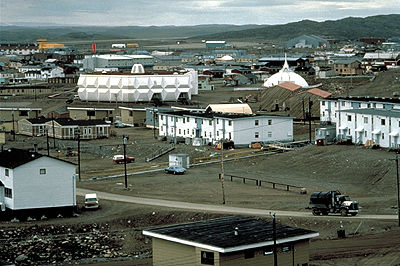
Events
Iqaluit Named
The town of Frobisher Bay, NWT, changed its name to Iqaluit.
-
December 14, 2000
Events
St. Roch II Arrives in Victoria
The St. Roch II arrived in Victoria, BC, after repeating the historic trip of its predecessor, the St. Roch, which in 1944 became the first ship to traverse the Northwest Passage.
-
September 09, 2014

Events
Franklin Expedition Ship Discovered
The HMS Erebus, one of Sir John Franklin's expedition ships, was found submerged off the coast of King William Island. The ship was part of Sir John Franklin's 1845 expedition to find the Northwest Passage from the Atlantic Ocean to Asia.
-
September 12, 2016

Events
Discovery of HMS Terror
A team from the Arctic Research Foundation (founded by Jim Balsillie) announced that they had found the second lost ship of the Franklin expedition, HMS Terror, in Nunavut’s Terror Bay, north of where the Erebus was found in 2014. The discovery was confirmed by Parks Canada on 26 September 2016.
